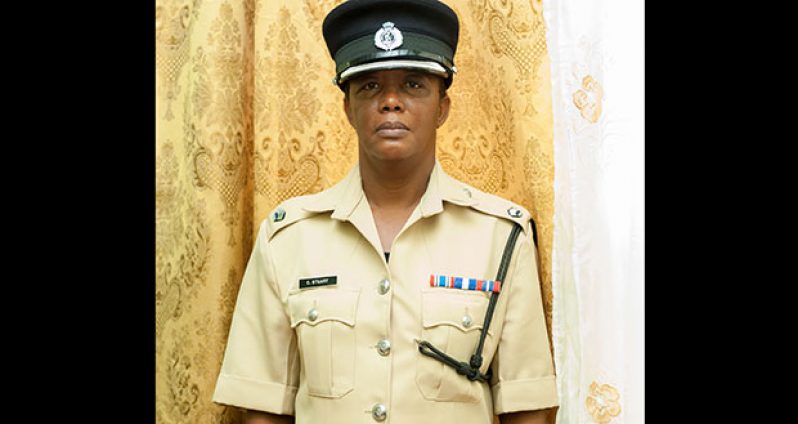— GPF tackling language barriers, culture shock and more
By Lisa Hamilton
IN its efforts to monitor and protect Guyana’s frontier locations amidst the COVID-19 pandemic, the Guyana Police Force (GPF) has faced challenges relating to language barriers, culture shock and education.
Disclosing how the Force has been operating in spite of the challenges was GPF Senior Superintendent, Charmaine Stuart, during the first round of the Tourism Recovery Action Committee (TRAC) stakeholder consultations, hosted online on Thursday.
Stuart presented on ‘Securing Frontiers and Protecting Border Communities as part of Tourism Recovery’. She listed the police stations located at Guyana’s frontier locations.
In Region One (Barima-Waini), stations are located at Imbotero, Baramita and Morawhanna; in Region 7 (Cuyuni-Mazaruni), they are located at Kaikan and Eteringbang; in Region 8 (Potaro-Siparuni), a station is located at Orinduik and, in Region 9 (Upper Takutu-Upper Essequibo), stations are located at Lethem/Takutu Bridge Crossing.
Stuart said that the Police Force is aware of a number of cases of illegal crossing near the Takutu Bridge making more difficult the work of the GPF and health officials in combating COVID-19.
“What is going on now is that most persons are coming through the illegal route to get into Guyana and that is where it poses a difficulty for the police to control that illegal point,” she said.
She also spoke to the reports of police officers assisting in the movement of illegal persons through border backtracks and noted that these instances are under investigation. Stuart urged persons with information on such acts to take it directly to the Commander responsible for the Region they live in.
LANGUAGE BARRIERS
When it comes to the authorized entry of persons to Guyana, the GPF has put in place strict measures to prevent the spread of the virus now and in the future when the country’s ports are opened up further.
These include a screening process conducted by a joint team of law enforcement officers, immigration officers and port health officers; escorts for movement/visits in and around tourist sites and shopping areas; uniform and plain clothes police along routes and shopping areas; special arrangements for domestic air travel to some tourist sites and networking with local tourist operators, village leaders and Community Development Officers.
Regarding the latter, Stuart said that in many remote areas, it is better to form working relations with village leaders as they are better suited to pass key information on to their communities. She explained that, given the existence of language barriers in some parts, Toshaos and village leaders help to bridge the gap.
“As law enforcement, we do not know all the languages. We know that it poses a challenge for us because we don’t know French, not all of us are fluent in Spanish, or Portuguese. So, from time to time, persons come into our country and they use those languages and, even in the Amerindian villages, there is a language barrier between the police and the communities,” she said.
Guyana, the only English-speaking country in South America, is neighbored by Spanish-speaking Venezuela, the Portuguese-Speaking Brazil and the Dutch-speaking Suriname. Many Guyanese in border regions also speak these languages due to their interactions with the people and time spent in those locations.
CULTURE SHOCK AND EDUCATION
In frontier areas, the Senior Superintendent also noted that, after the ‘arrival’ of COVID-19, persons in those regions would have had to immediately adapt to a new way of life which has not been easy.
Stuart said that the GPF is aware of this cultural shock and of the mental health implications it can have on some individuals. “It’s a cultural shock, it can also cause persons to go into depression and it can also cause persons to be stressed out because they cannot get to go [about] their normal way of life and do the things they are accustomed to doing, so their whole culture has changed,” she said.
The Senior Superintendent pointed out her belief that, in these areas, more education is needed to ensure that persons understand the gravity of the situation and how they can protect themselves.
In her collective recommendations, she proposed continuous capacity building; strict monitoring at all ports, including the Lethem bridge crossing and Moleson Creek; the monitoring of compliance by all entertainment operators and hotelier and public awareness campaigns to sensitise visitors and tourists when they are allowed into the country again.
During the question and answer segment, Stuart fielded several questions which she either provided answers to or noted that she would seek further advice.
Coming out from the discussion there was the recommendation from the audience that the GPF set up a police outpost near the neighbouring Brazilian village of Normandia as it is alleged that many backtrackers utilise the location.











